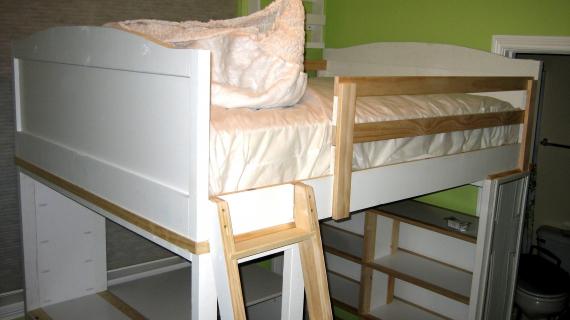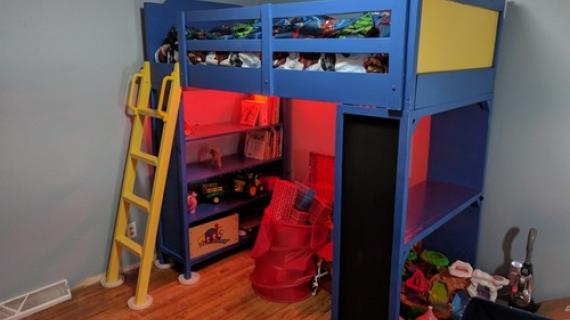
Top bunk for the Chelsea Bunk System. This bunk is designed to work with a desk system and a bookshelf, creating a bunk bed system with storage. The bottom bunk sits perpendicular to the top. The little details make this bunk a touch more girly, but just as strong, and even easier to build. Features optional full guardrails.

Preparation
1 - 2x6 @ 8 feet long or stud length
2 - 1x6 @ 10 feet long
3 - 2x2 @ 8 feet long
1/2 sheet - 3/4" plywood, particle board or MDF
11 - 1x3 @ 8 feet long (used for slats and guardrails - adjust the amount you buy to your needs)
2 - 2x6 @ 39" (Headers - cut out in step 1)
2 - 3/4" plywood, particle board or MDF @ 17 1/2" x 39" (panels)
2 - 1x6 @ 39" (Panel Bases)
4 - 2x2 @ 21" (Legs)
2 - 1x6 @ 75" (Siderails)
2 - 2x2 @ 75" (Cleats)
14 - 1x3 @ 39" (Slats)
Guardrails
2 - 1x3 @ 75" (long guardrails)
2 - 1x3 @ 62" (you may wish to make these shorter)
5 - 1x3 @ 17 1/2"
10 - scrap 1x3s to fill gaps
Please read through the entire plan and all comments before beginning this project. It is also advisable to review the Getting Started Section. Take all necessary precautions to build safely and smartly. Work on a clean level surface, free of imperfections or debris. Always use straight boards. Check for square after each step. Always predrill holes before attaching with screws. Use glue with finish nails for a stronger hold. Wipe excess glue off bare wood for stained projects, as dried glue will not take stain. Be safe, have fun, and ask for help if you need it. Good luck!
PS - you can click any image for a larger view.
Instructions
Step 1
Mark the headers as shown above and carefully cut out with a jigsaw. Sand cut edges.
I know it's not easy to cut 1 1/2" thick stock with a jigsaw - practice, take your time, give yourself room to make errors. You will need to cut two of these.
Once you have both headers cut, clamp together, and sand the top edges until both match perfect. Start with coarse sandpaper and work your way down to medium grit.
Step 2
On the panel, if you are using the Kreg Jig, you will want to drill all pocket holes before assembly. If you do not have a pocket hole jig, what you can do is use the 2x2 legs to screw the header in place, and attach the header to the panel with glue and clamps.
Step 3
Step 4
This is what I was referring to in step 2 - if you do not have a pocket hole jig, you can screw through the legs into the header with 3" screws (predrilled with a countersink bit) and this will keep the header in place. You will need to apply ample glue along the bottom edge of the header if you take this route.
Attach the legs to the panel. Use either countersunk screws from the outsides of legs, or pocket holes drilled in step 2.
Step 6
Step 7
It is always recommended to apply a test coat on a hidden area or scrap piece to ensure color evenness and adhesion. Use primer or wood conditioner as needed.


























Comments
ferbit
Tue, 05/10/2011 - 08:40
Yay!!!!!
Sooooo hard to not build this whole set right now! Too many things going on, but yay!!! This will make a great fall project. Thank you Ana!!!!
tracysmith
Thu, 06/02/2011 - 12:59
Ladder?
Are there plans for the ladder somewhere and I'm just not seeing them? Thanks for posting this, my neighbor is in love with this right now and I'm hoping I can talk her into letting me build it for her since my kids are "too old" for this bed. :-(
Guest (not verified)
Tue, 08/02/2011 - 07:24
Ladder
Don't know if this will help but I found instruction on building a ladder under Twin over Full Simple Bunk Bed Plans
April @ Team T… (not verified)
Mon, 08/20/2012 - 11:05
Ladder
Look at Step 14
http://ana-white.com/2010/05/furniture-plans-loft-bed.html
Mindy (not verified)
Sun, 11/13/2011 - 13:02
Chelsea Standard Bunk
Hi Ana!
My hubby and I have been going over your different bunk bed plans and I'm wondering if you have anything drawn up to make this Chelsea one a standard twin over twin.
Thanks so much!
Mindy @ Rindy Mae
SarahBartel (not verified)
Mon, 10/22/2012 - 12:46
Which plan(s) did you use for
Which plan(s) did you use for the bottom bunk bed, book shelf and desk area?
Thank you so much for your dedication and your continual awesome plans!
Kimberly Tinney (not verified)
Mon, 10/29/2012 - 10:47
Alterations?
Think you could use wood paneling in place of the plywood? Or something kind of with the look of wainscot? I think this bed is beautiful but I like the added feature of the paneled look.
Also, we're hoping to make this a loft style bed, with another bed perpendicular to it, also loft style...eventually so we have a third bed on the ground beneath them all. Any suggestions on how to amend it? I was thinking maybe building the bookshelf on one end and just using 2X4s on the other end, bolted to the wall.
Kimberly Tinney (not verified)
Tue, 11/27/2012 - 17:20
4X4 supports
Anyone think it's possible to just replace the 4 posts on the edge with 4X4 posts so it is a true loft bed...not up on a dresser??? I like the idea of the whole system but I am trying to get these beds done quickly and I don't have the time to build everything else. I would like to build one at loft height and one at junior height so I can put them as an "L" in the corner and eventually when my youngest is in a big girl bed, I will put a third bed near the ground.
Thanks
PedroLlanas
Sun, 02/21/2016 - 12:44
Strong support legs and ladder placement
I made a twin bed from your site before. With it fitting underneath and a dresser, I'll have no room for the shelves. Can you suggest frame legs that would also accommodate a ladder that attaches to the foot end of the top bed?
Thank you